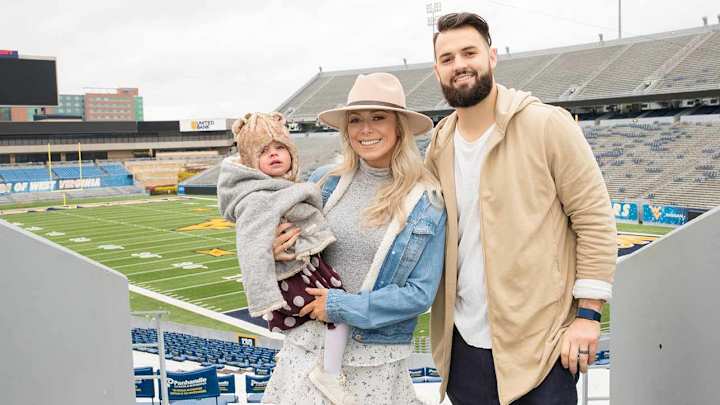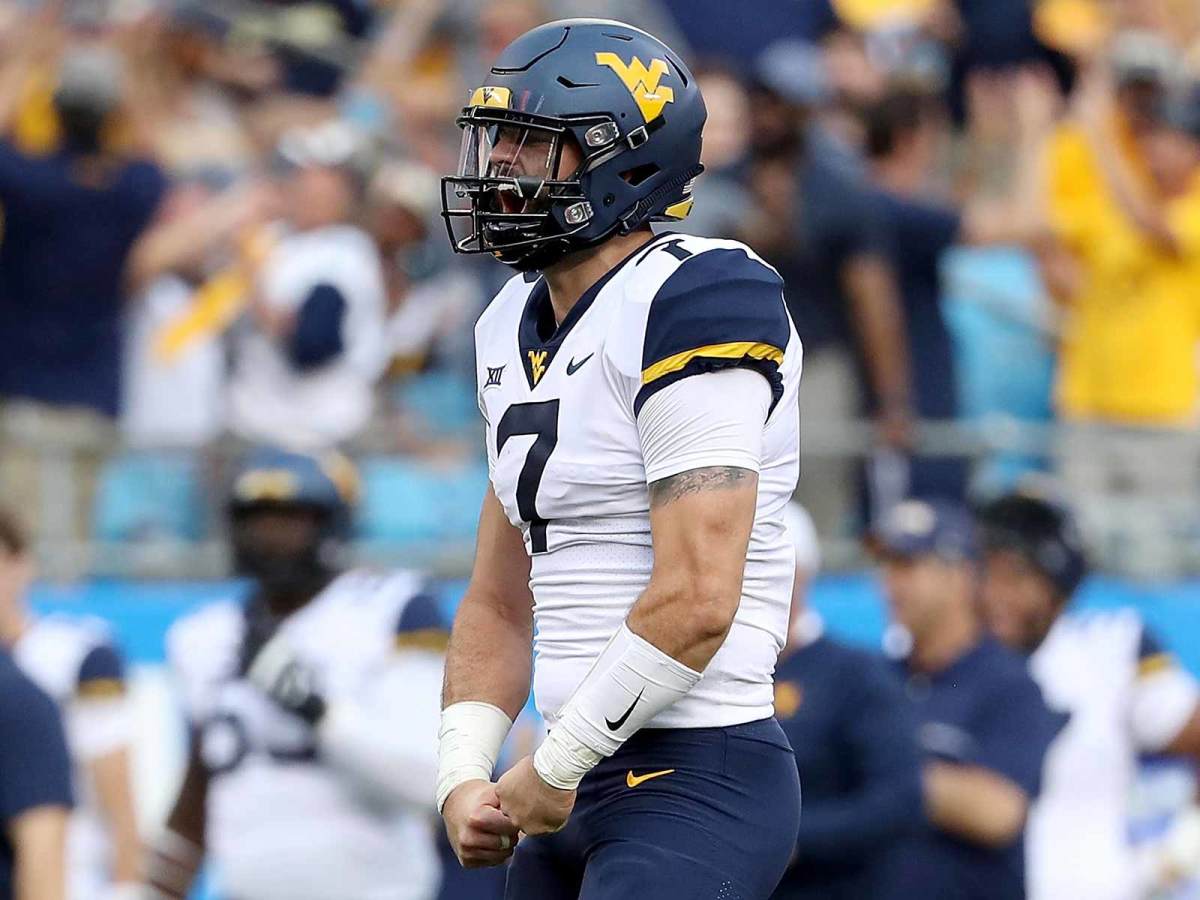Centered by Fatherhood, Will Grier Is Enjoying the Final Year of His Winding College Career

Start a free seven-day trial of SI TV today to watch the full feature on West Virginia star quarterback Will Grier, along with other in-depth interviews and features on the biggest names in sports.
It’s still early in his parenting career, but 23-year-old Will Grier has already mastered an essential #DadLife skill: scavenging. He knows his soon-to-be two-year-old daughter, Ellie, has no more use for the golden hash browns that she set down after a couple of nibbles. And it would be irresponsible to let something so tasty go to waste. So Grier holds a patty in one hand and alternates bites with sips of coffee from a massive mug with KING printed on it.
He briefly considers a visitor’s observation that many people may not reach neeeeed-my-coffee mode until after college and says, “Did you have kids when you were in college?”
Grier, the senior quarterback at West Virginia, has celebrated plenty of joyful events since arriving in Morgantown two years ago, but one of the most satisfying came about 15 months ago after he and his wife, Jeanne, returned from a weekend away. Grier’s mom, Elizabeth, had offered to watch Ellie to give the young parents a chance to recharge after spending nine months sleeping in shifts. Grandma, the wily veteran, let Ellie remain in her crib instead of picking her up every time she cried. When Mom and Dad returned, Ellie had slept through the night for the first time.
“There are so many moving parts in his life,” says offensive coordinator Jake Spavital, 33, whose second child was born just before the season. He finds a sounding board in his young quarterback. (“Ooh, teething,” Grier says. “That’s a tough stage.”) Spavital, who coached Geno Smith with the Mountaineers and Johnny Manziel at Texas A&M, revels in coaching someone who has reached a different stage of life than most of his peers: “I think that’s why he’s so calm and collected when he’s playing.”
The No. 13 Mountaineers are 6–1 and about to begin a four-game stretch (at Texas, home against TCU, at Oklahoma State, home against Oklahoma) that will decide whether they compete for the Big 12 title for the first time since joining the league in 2012. Grier, meanwhile, has already inserted himself into the Heisman Trophy conversation. He has thrown for 2,272 yards and 25 touchdowns, including 353 yards and three TDs on Oct. 25, in a 58–14 victory over Baylor in a much-needed bounce-back win after a 30–14 loss at Iowa State.
Anyone who watched Grier burst into the college football zeitgeist in 2015 could envision a potential Heisman candidacy down the road. Back then, he was a redshirt freshman at Florida who introduced himself to the nation on a fourth-and-14 play from the Gators’ 37-yard line against Tennessee. Florida trailed by six, 27–21, and the clock was running. After being sacked on third down, Grier picked himself up and looked for a signal from the sideline. None came. Florida coaches wanted to run a play called “Big Ben In” but didn’t have a signal for it. “We practiced it every Thursday, but it wasn’t something we ran much,” Grier says. “I ran over to the sideline, and the whole sideline was yelling the play at me.”
With 1:39 left, Grier took the snap. He had ample time because the Vols rushed only three defenders. Receiver Antonio Callaway settled into a soft spot in Tennessee’s zone and Grier found him. The Gators had their miracle first down, but Callaway wasn’t done. He took off toward the right sideline and—thanks to a block from wideout Brandon Powell—sprung free and sprinted into the end zone. Jorge Powell then kicked the extra point to give the Gators the win. “That’s the loudest I’ve ever heard a stadium,” Grier says. “The place was shaking.” The following week, he completed 24 of 29 passes for 271 yards and four touchdowns as Florida stunned No. 3 Ole Miss, 38–10. Grier appeared to be the quarterback the Gators had been seeking since Tim Tebow graduated in 2009, a slinger who could make Florida contenders for the national title again. Seven days later, Grier would throw his final pass as a Gator.
Grier never courted the spotlight—unlike his younger brothers, Nash and Hayes, who were busy shooting videos on their phones while Will was finding his way in college. Nash, now 20, has 9.9 million followers on Instagram and seven million on Twitter. Hayes, now 18, has competed on Dancing with the Stars and has 5.5 million Instagram followers and his own Web show called Top Grier. But, as Will has learned, the spotlight has a way of finding quarterbacks too.
The day after a 21–3 victory at Missouri, coach Jim McElwain called Grier into his office. He was told that he had tested positive for a performance-enhancing drug during an NCAA-administered test. His suspension would last a year, so he wouldn’t be eligible until the seventh game of the 2016 season. “I really hope that people can learn from my mistake,” Grier said in a press conference the next day, choking back tears, “and I’m really sorry to everyone.”
Grier had tested positive for Ligandrol, a selective androgen receptor modulator that is used to treat muscle wasting. He bought it at a supplement store, and, at the time, it did not appear on the NCAA’s banned substance list. But Grier later learned that all selective androgen receptor modulators are banned whether the specific drug is on the list or not. Had he run Ligandrol by the Florida trainers, they would have advised him that it was banned. “I was just careless. I was ignorant,” Grier says. “I should have consulted with the trainer about what I was doing. I just didn’t. ... I was caught and blindsided by it. It was obviously very upsetting. But what I learned is this is a big stage. You have to make sure every little thing you do is done the right way.”

At 6' 2" and 223 pounds, Grier has always had the physique of a quarterback with NFL potential. But his journey to national prominence has been a winding road.
Playing for his father, Chad, at Davidson Day School in the suburbs of Charlotte, Will threw for 14,565 career passing yards and 195 touchdowns. Early in the college recruiting process, he decided to accept a scholarship offer from Clemson. But another quarterback had beaten him to the punch. “Deshaun Watson committed about a week before I was going to,” Grier says. Watson would lead the Tigers to two ACC titles and the 2016 national title before becoming a first-round draft pick of the Texans. Grier had also liked Tennessee early on, until coach Derek Dooley was fired in November 2012.
Grier ultimately settled on Florida because of coach Will Muschamp, and because the Gators had a defense full of future NFL players he could practice against. But then Muschamp was fired during Grier’s 2014 redshirt season.
About a month after Florida hired McElwain, someone else entered Grier’s life. She would help him navigate the rollercoaster ride that was about to begin. The Swamp isn’t just the nickname of Florida’s Ben Hill Griffin Stadium. It’s also a two-story bar across University Avenue with a lawn that becomes the most popular place in Gainesville on sunny afternoons. In January 2015, Grier went there with a group of friends. “Who is that?” he asked one of his companions. Jeanne O’Neil had just transferred to Florida after earning an associate’s degree in Tampa. When they met, the former Buccaneers cheerleader asked him, “What position do you play?” Before long, they were inseparable.
During the suspension, O’Neil helped buoy Grier as he struggled with losing his identity: He’d always been the quarterback. “I just felt irrelevant,” he says. “I felt like I was not going to have much of a chance to play there again. [McElwain] was ready to move on and encouraging me to get a fresh start. He said he’d help with the transfer process and that he thought it would be good for me. I thought, ‘If you’re telling me that, I guess it’s kind of a hint. I should do it.’”
Grier knew he would have to sit out the 2016 season to satisfy the NCAA’s transfer rules, but he figured he could do that at the same time he served his 12-month PED suspension. On a recruiting trip to Morgantown he learned that the NCAA might force him to miss the first six games of ’17 too. West Virginia coach Dana Holgorsen told Grier that he’d give him a scholarship even if Grier had to sit out the first half of the 2017 season. “It was important to be with a coaching staff that didn’t just believe in my football ability,” Grier says. “I wasn’t just a number to them or somebody that they’d plug into their system. That was a big reason I came here.”
Another reason was Holgorsen’s system. West Virginia runs a quarterback-friendly offense that encourages frequent downfield shots. Grier couldn’t wait to get started, but he’d have to bide his time on the practice squad.
In November 2016, Ellie was born. She arrived two days before the Mountaineers played Texas in Austin and Grier watched the game on TV with his new daughter by his side. What followed were the usual struggles of new parents—sleepless nights and questioning what the tiny human might need to stop screaming. At practice, Grier struggled through the fall of 2016 and the spring of ’17 as he tried to balance school, football and fatherhood.
Chad Grier calls it “a period of compression.” Says Chad, “He had to make a choice. It was a conscious decision to say, ‘This is the man I’m going to be.’ He’s done it beyond anything I think I could have done at his age.”
Last fall, Will was eligible to start the season-opener and, despite breaking a finger on his throwing hand in November, he passed for 3,490 yards and 34 touchdowns, eighth most in the country. His performance in the final four games of 2018 could determine whether he will be invited to New York City in December to sit alongside Alabama quarterback Tua Tagovailoa and Oklahoma quarterback Kyler Murray at the Heisman ceremony.
As he looks back on how far he’s traveled, Grier says there are two guides in his life now: one is the best friend he gets to live with for the rest of his life; the other a spunky, willful blonde who turns two this month. “Having a kid is hard to explain, but when you talk to another parent, you have mutual understanding of what that does to you as a person,” Grier says. “It’s this deep love. It gives you perspective on life, on where you came from. I think it also gives you a new perspective on the way you live your life. It’s not just you.
“After everything that’s happened, I’m sitting here in my last year of college football. I’m just happy. I’m in a good spot.”
